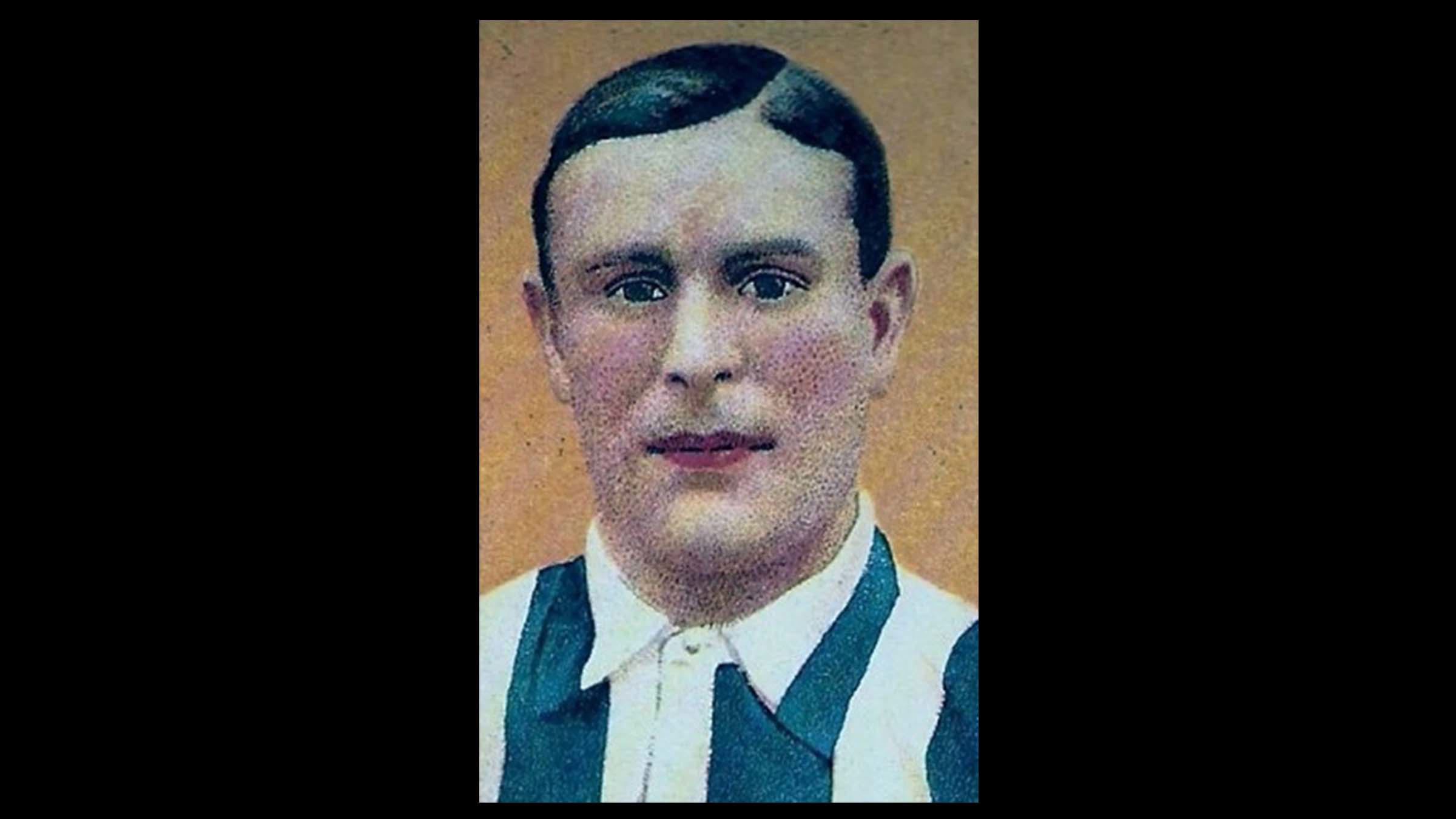Next Tuesday marks 30 years since John de Wolf wrote himself into Molineux folklore, and historian and author Clive Corbett has looked back at the Dutchman's remarkable hat-trick against Port Vale.
The penalty shootout win over Sheffield Wednesday on 8th February, 30 years ago would in normal circumstances have been enough excitement for a typical football season, but just under three weeks later a certain Dutchman would earn his own slice of immortality.
At Vale Park on Saturday 25t February, John de Wolf wrote himself into the club’s history books by becoming only their second defender to hit a hat-trick, emulating the feat of Ted Pheasant in 1903. Signed from Feyenoord in December, 1994, the Netherlands international, who had won eight caps before coming to Molineux, achieved cult status at the club despite starting only 32 games.
Early leaders, Wolves had faltered in their bid for the lone automatic promotion place that was on offer that season. In fact, a 2-0 home defeat in midweek by eventual champions Middlesbrough meant they were then not even in the play-off places.
So victory at a muddy Vale Park was essential if they were to get back on track and Wolves were given a pre-match boost with news that Steve Bull was fit to return after a long injury lay-off because of Achilles tendon problems.

Manager Graham Taylor had kept the striker’s return under wraps: “I did not feel it was in his best interests to hype up his return. It was his first game for seven or eight weeks so it was a bit of a gamble.”
However, it was De Wolf who stole the limelight. He opened the scoring after only two minutes. A Robbie Dennison corner was not cleared and De Wolf rammed the ball home just when it looked like Bull was setting himself up for a shot.
On 18 minutes Tony Naylor put the home side level when goalkeeper Paul Jones could not hang on to a long range shot by Ray Walker. Vale were in command at that stage but de Wolf helped turn the match on its head in the two minutes before half-time. De Wolf back headed another Dennison corner into the net to make it 2-1 despite a frantic effort by Steve Guppy to hook the ball out.
There was no keeping De Wolf from the door and it was his through ball which Don Goodman flicked on for Bull to run on and lob the out-rushing Vale ’keeper Paul Musselwhite.
Kevin Kent reduced the arrears on 56 minutes but 12 minutes later De Wolf restored the two-goal advantage when he completed his historic hat-trick from the penalty spot.
Kevin Scott handled under pressure from Bull and usual spot-kick specialist Andy Thompson stepped aside to let the rampant De Wolf take the kick. De Wolf was not going to miss the chance of a treble and he thumped the ball home.

The Dutchman was flying and his place as a fans’ favourite was secure. He also had the match ball as a souvenir and said afterwards: “This is the first hat-trick of my career, my first match ball and my first prize in England. Let’s hope it’s not my last.”
Thommo’s previous spotkick just 17 days earlier had seen him fail in the epic FA Cup replay shootout with Sheffield Wednesday which Wolves won 4-3 after trailing 3-0. In that same shoot-out, De Wolf had been ice-cool when he levelled it 3-3.
Thompson had earlier in the season been spot on against Port Vale when Wolves won 2-1 at the beginning of October, with both goals coming from 'Thommo' penalties. He was still the designated taker for the Vale Park game but told us he had urged De Wolf to take the kick. “I said ‘Go on, get your hat-trick’ and he took it.”
Sadly, a knee injury sustained against Sunderland just two games later meant that De Wolf missed the final 13 Division 1 games that season. Injuries blighted his time at Molineux and he eventually returned to Feyenoord where he was a coach. The season also had an unhappy ending for Wolves as they were beaten by Bolton in the semi-final of the play-offs.
What of the little-known man whose achievement De Wolf equalled 30 years ago? It was a rare feat that Ted Pheasant had accomplished at Molineux in a 3-0 win over Newcastle United on a pleasant Monday evening almost 93 years earlier than the Dutchman - three goals by a central defender.

Pheasant had joined Wolves as an 18-year-old from Wednesbury Excelsior in 1895. A formidable obstacle to any opposing forward, he stood well over six-foot and weighed over 15 stone. He could hit a dead ball with considerable power and one of his goals against the Geordies was a long range free-kick. It gave England international goalkeeper Matt Kingsley no chance.
Wolves took the lead after 20 minutes when a corner produced a goalmouth melee from which Pheasant emerged to put the ball home. Two minutes later came his free-kick special and Wolves went in two up at half-time.
The big man would probably have been well pleased with two goals to his name but in the last minute he struck again to complete his hat-trick. He lost possession but won the ball back before beating Kingsley for a third time.
This was how the Sheffield Telegraph report described the goal: “Close upon time Pheasant ran upfield and though intercepted he regained possession of the ball and scored in brilliant style.” To mark his achievement, Pheasant received an inscribed gold watch from the club.

Two days earlier Wolves had beaten Liverpool 3-1 at home and the team were looking impressive as confirmed in the Sports Argus: “It is no exaggeration to say that the Wanderers against Liverpool and Newcastle gave two of the finest exhibitions of football seen at Molineux this season. Every man was a tower of strength in himself, deft individual touches, cohesive movements and free passing bouts indicating the tone of the Midlanders’ attack. Everyone joins in the eulogy upon the Wanderers’ play.”
Of Pheasant, the paper said: “The versatile centre-half is one of the mainstays of the club and there is not a harder worker to be found.”
The outlook seemed bright indeed and the win took Wolves to sixth in the table but they did not push on and would win only one of their last six games to finish 14th in a division of 18 clubs. In contrast, Newcastle revived their season and finished third behind champions Sunderland. Five days after the Molineux meeting the Geordies gained revenge, winning 3-1 at St James’ Park.
Pheasant scored in each of the final two games of the season – twice in a 3-1 home win over Blackburn and the lone goal when Wolves lost 2-1 at Bury. That took his total for the season to seven, making him the club’s third highest scorer in the league.
By the time he left Molineux he had totalled 19 goals from 168 appearances. He later joined West Bromwich Albion and gave them stalwart service for several seasons before being transferred to Leicester Fosse, as Leicester City were then known. He never played for his new club. He contracted peritonitis and was dead at the age of 33.
3 GOALS FOR TED PHEASANT
Wolves 3-0 Newcastle United | Monday 10th March 1902 | Division 1
Wolves | Baddeley; Jackery Jones, Walker, Whitehouse, Pheasant, Annis, Fellows, Haywood, Preston, Wooldridge, Miller.
Newcastle | Kingsley; Bamlett, Davidson, Gardner, Aitken, Caie, Stewart, Orr, Peddie, Rutherford, Roberts.
3 GOALS FOR JOHN DE WOLF
Port Vale 2-4 Wolves | Saturday 25th February 1995 | Division 1
Port Vale | Musselwhite; Sandeman, Tankard, Walker (Glover 82), Aspin, Scott, Guppy, van der Laan, Foyle (Allon 82), Naylor, Kent.
Sub: Van Heusden.
Wolves | Jones; Blades, Thompson, Rankine, De Wolf, Shirtliffe, Goodman, David Kelly, Bull (Venus 77), Cowans, Dennison.
Subs: Smith, Stowell.
















